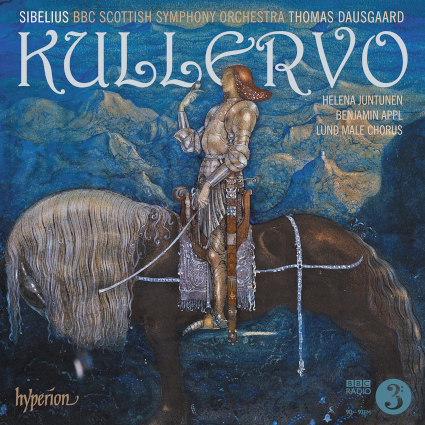Kullervo is a musical act of defiance, written as it was at a time when Finland was resisting efforts by Russia to curb its freedoms. This adds context to the figure of Kullervo himself, a child born into suffering. One can appreciate Kullervo without knowing the Kalevala, but it does enhance meaning. Runes XXXI to XXXVI give Kullervo’s background. He’s cruelly mistreated by an uncle who stole his patrimony. He’s tortured and sold into slavery. When he meets the maiden, he rapes her because he wants what she represents, yet, raised in cruelty, he doesn’t have what we might call “social skills”. Dreams of his long-lost mother have kept him going , so when he discovers that the woman he has violated is his sister, he suffers such guilt that he must offer his own life in appeasement. I’ve often wondered if Sibelius himself realized how daring Kullervo was and, being a worrier, pulled back, as he might have pulled back from the enormity of his conception for the Eighth? Once, Sibelius performance practice presented the composer in sub-Tchaikovsky terms, which really doesn’t do the work justice. Kullervo resets the balance so we can think ahead to the inventiveness of later Sibelius.
The first modern recording took place in 1970, shortly after the rediscovery of the manuscript, with Paavo Berglund and the Bournemouth Symphony. For fifteen years, there was no other recording until Berglund’s second version, with the Helsinki Philharmonic, a darker re-evaluation. In recent years, the work has been critically re-edited, (Glenda Dawn Goss for Breitkopf & Härtel), and performance practice greatly enhanced. Dausgaard’s approach with the BBC Scottish Orchestra captures the audacity in the piece. From a hushed opening, the Allegro Moderato grows with ever increasing impatience, as if it were an Overture to an opera, for a quasi-opera this is. One cannot overestimate the impact of Wagner and his”forest murmurs”, though even at this early stage in his career, Sibelius was seeking a new sound world. Kullervo comes alive with the rhythms of the Kalevala, with its strange, primitive pulse and shamanistic repetitions. Hence the short, sharp intervals in the brass and winds, and the driving pizzicato in the strings, creating a sense of tense, ritualized movement. Even to our ears accustomed to Stravinsky, Bartók and Janáček, Kullervo still sounds primeval. Yet it was written twenty-one years before The Rite of Spring.
Dausgaard also emphasizes the sophistication that lies beneath the ostensible rawness. This is not simply folk tale for grand orchestra but an imaginative approach to dynamics. The contrast between emotional extremes and the tight, staccato-like figures creates abstract narrative tension. It’s as if we’re hearing Kullervo’s nervous heartbeat, pulsating with frustration. In the second movement “Kullervo’s Youth”, the pulse flows strongly, dotted rhythms suggesting forward thrust. Forceful chords suggest alarm, but the pulse returns, quietly but purposefully.
The heart of Sibelius Kullervo lies in the long central movement “Kullervo and his Sister”. A magnificent introduction, where Dausgaard and the orchestra make the string lines shiver : given what is to come this is no minor detail. The Lund Male Chorus enter with sharply focused attack, their lines intoned with menacing portent : this is incantation as much as song. “Kullervo, Karlevon poika !” The pulse in the orchestra surges even more powerfully, evoking at once the speed of the sledge and the implacable force of fate. Quieter moments intensify contrast. Kullervo (Benjamin Appl) and his sister (Helena Juntunen) confront each other. Juntunen’s lines tremble with palpable frisson, yet her every syllable is clearly defined. Her soliloquy “En ole sukua suurta, Enkä suurta, enkä pientä” is a tour de force. Her timbre is at once sensual and tragic, creating the complexity in the character. Woodwinds suggest the calls of birds, or hunting horns, for the prey here is human. Thrusting staccato surrounds Kullervo – testosterone in music – yet his lines curl tentatively : beneath his brutishness, Kullervo is also a victim of forces beyond control. Appl’s delivery is a bit too heroic, since Kullervo is no hero but a very fractured personality. Though he sings well, his need to channel Fischer-Dieskau, with whom he worked for a very brief period, increasingly works against interpretation. Voice is not enough : a singer needs to be himself.
A particularly dramatic “Kullervo goes to Battle”, string lines flying, winds shrill and piercing. In this movement, one can hear the driving sense of propulsion that Sibelius would later use so effectively. Again, passages of tenderness, lit by scintillating winds, add a poignant touch : once, Kullervo was meant for better things. A rousing, exhilarating finale – by seeking death he will at last overcomes shame and find redemption. Thus the return of Chorus in the final movement, intoning solemnly, accompanied by mournful brass. The steady pulse returns, too, though now funereal and hushed. The movement reaches its final, valedictory climax, the orchestra in full flow, the chorus singing with powerful force. “Loppu ainaki urosta, Koulema kovaosaista.” Heard live this can blast you out of your seat. Dausgaard and the BBC SSO demonstrate what a remarkable work Kullervo can be.
Anne Ozorio
